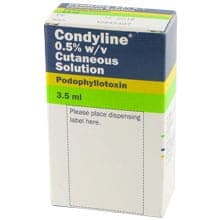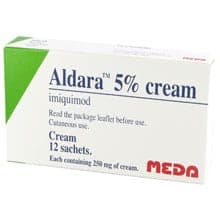Login to your account
- Prescription included
- Genuine medication
- All-inclusive service - No hidden fees
- Free next-day delivery
Genital Warts
Get genital warts medication with an online prescription
Genital warts are one of the most common forms of sexually transmitted infections (STIs) in Europe. They are caused by the human papillomavirus (HPV) and are very infectious. They are small itchy bumps that appear on and around the anogenital area.
They are not curable, but outbreaks can be managed with treatment. Learn more about the cause, symptoms and treatments of genital warts.
On this page
What are genital warts? What causes genital warts? How are genital warts spread? What are the symptoms of genital warts? Do genital warts cause cancer? How are genital warts diagnosed? How do I treat genital warts? How do I prevent genital warts? Can I buy genital warts treatments online?Available Treatment(s)

- Easy-to-apply solution
- Effective treatment for genital warts
- Convenient treatment schedule

- Effective treatment for genital warts
- Easy to apply
- Works within 16 weeks
- Fast-acting wart treatment
- Quick and easy to apply
- Delivered discreetly to your doorstep
What are genital warts?
Genital warts are a type of highly contagious viral STI (sexually transmitted infection). They are caused by HPV (human papillomavirus).
This highly contagious STI many across the globe. The prevalence varies with age, sex, ethnicity and sexual orientation. However, it is most prevalent in the 20 to 24-year-old age group.
Genital warts are spread through unprotected sexual contact, including vaginal, oral and anal sex. The warts themselves look like small growths of flesh, but can also be shaped like a cauliflower.
There are many ways to get rid of genital warts. However, for some, the virus may continue to live in the skin and can cause frequent outbreaks.
What causes genital warts?
Genital warts symptoms are caused by the virus human papillomavirus, more commonly known as HPV. It is a very common STI. It is estimated that 85-90% of sexually active men and women will have HPV at some point in their lives.
There are over 100 different known types of the HPV virus. It is usually HPV types 6 and 11 that result in genital warts. Other strains are more high-risk and can result in certain types of cancers, including cervical cancer in women.
You catch genital warts from contact with someone with the virus. The virus can spread even when symptoms are not present. Once contracted, the virus will remain in your body for some time and can cause future outbreaks.
Usually, your immune system keeps the virus at bay. In 90% of cases, your immune system clears an HPV infection. However, certain factors may prolong the infection.
What causes an outbreak of genital warts?
Certain environmental and lifestyle factors can trigger genital warts outbreaks and mean the infection takes longer to clear.
Smoking |
Drinking alcohol |
Suppressed immune system |
Unprotected sex |
Contracting other STIs |
Stress |
How are genital warts spread?
Genital warts are highly contagious, and you can catch the virus in several ways:
- skin-to-skin contact with the affected area
- unprotected vaginal sex and anal sex
- oral sex
- sharing sex toys
- from mother to baby during childbirth
You cannot catch the virus from kissing or from sharing towels, cutlery, cups or toilet seats.
What are the symptoms of genital warts?
The most defining symptom of genital warts is painless growths or lumps in the penis, vagina or anus.
They can vary in size and shape but usually have a cauliflower appearance. Some may experience single warts while others may experience them in groups.
While warts aren’t painful, they can cause itching or bleeding. They may also affect your urine stream - it may go sideways when it usually does not.
However, some people have no visible symptoms for months but still have contracted the virus. That’s why it’s important to get regularly tested for STIs to avoid spreading them.
Do genital warts cause cancer?
Genital warts do not cause cancer. They are caused by low-risk strains of HPV that only result in genital warts.
Some high-risk strains of HPV can increase the risk of certain cancers. Studies reveal that 4.5% of cancer cases worldwide are caused by HPV. These strains of HPV damage the DNA which can lead to abnormal cells developing which can lead to cancer.
Cervical cancer is almost always caused by HPV which is why routine screening is offered to women. It can also cause vaginal cancer, vulva cancer, penile cancer, anal cancer and cancers of the throat and mouth.
How are genital warts diagnosed?
Genital warts can look like several other mild conditions, including ingrown hairs and razor bumps. So, you should get your symptoms checked if you’re not sure.
A healthcare professional will be able to diagnose your symptoms by looking at them. They will also ask about your sexual history and your previous partners.
How do I treat genital warts?
There are several ways to treat genital warts, including medications and procedures.
You must avoid perfumed products during treatment, as these may irritate your skin.
You should also check whether the treatment affects contraception such as condoms, diaphragms or caps. Although, you should avoid having sex while you have active symptoms.
Prescription medications
The most common and simple way to treat the symptoms is by using prescription medications. You apply them directly to the warts several times a week.
One available treatment is Podophyllotoxin, available as a cream and solution under several brand names such as Warticon and Condyline. It works by attacking the wart cells to allow healthy skin cells to grow in their place.
Another available treatment is Imiquimod (Aldara). It works similarly to Podophyllotoxin. However, it can also be used to treat hard warts and anal warts.
Warts take some time to disappear, so you must continue to use the medication exactly as it has been prescribed.
Surgery
Depending on the nature of your symptoms, your doctor may recommend a minor procedure. You may be eligible for surgery if your warts are:
- too large or numerous to be treated with topical treatments
- not responding to treatment
The procedure will involve either cutting, burning or lasering off the warts. It may cause some pain and irritation.
Freezing
Cryotherapy is another minor procedure for wart removal. It is one of the few treatments available for use during pregnancy.
This involves freezing off the warts one by one using liquid nitrogen. The treatment has to be repeated weekly for 3 - 4 weeks.
Like surgery, however, it can cause uncomfortable side effects. There is also a small chance that warts recur after a few months.
How do I prevent genital warts?
Thankfully, genital warts are preventable.
- You should practice safe sex by wearing barrier protection such as male or female condoms.
- Some people have symptoms that are not covered by a condom. If that is the case, do not have sex until the symptoms have cleared.
- Have regular STI tests - especially if you frequently change partners. You can get tested for free with remote testing services or at your local sexual health clinic.
- Get the HPV vaccine. It is used to prevent HPV-related cancer and is routinely offered to young girls in the UK. Statistics have also shown a drop in genital warts cases due to the vaccine.
- Be open with your partner(s) about your sexual history.
Following all of these will significantly reduce your risk of catching and spreading genital warts or any other STIs.
Can I buy genital warts treatments online?
You can order genital warts treatments online, including Aldara, Warticon and Condyline, from euroClinix. We offer a safe and secure ordering process, which includes an online consultation.
It involves a few short medical questions, which our doctors will review. If it is safe for you to take this medication and can benefit from it, they will issue a prescription. Our pharmacy will then dispatch your treatment and you will receive it as soon as the next day.
Further reading

The Effects of Alcohol on Antibiotics: Complete Safety Guide
Reviewed by Dr. Caroline Fontana
5 foods to eat while on antibiotics
Reviewed by Dr. Caroline Fontana
Burning sensations after sex: causes, treatments and when...
Reviewed by Dr. Caroline Fontana

What genital warts look like and what causes them
Reviewed by Dr. Caroline FontanaSelect
medicationFill out a short
medical formDoctor issues
prescriptionMedication sent
from pharmacy



